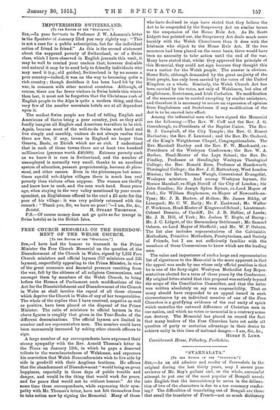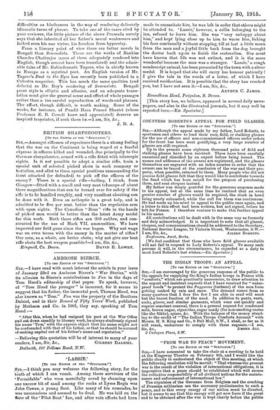"SVARNALATA."
[Ts. THE EDITOR OF Ts. ms."] SIR,—As an old admirer and reader of Sournalata in the original during the last thirty years, may I assure you'. reviewer of Mr. Roy's gallant and, on the whole, successful attempt to put one of the most popular of Bengali novels into English that the inconsistency he notes in the delinea- tion of two of the characters is due to a too summary render- ing i' The difficulties of translating out of Bengali are those that assail the translator of French—not so much dictionary difficulties as hindrances in the way of rendering delicately idiomatic turns of phrase. To take one of the cases cited by your reviewer, the little picture of t he shrew Pramada merely says that she inherited all her father's moral weaknesses and lacked even his one virtue, his freedom from hypocrisy.
Prom a'literary point of view there are better novels in Bengali than Brarnalata. There are the works of Bankim Chandra Chatterjee (none of them adequately tendered into English, though several have been translated) and the admir- able tales of Mr. Rabindranath Tagore, who is chiefly known in Europe as a mystical poet. An English version of Mr. Tagore's Duet in the Eyes has recently been published in a Calcutta magazine. This has much the same qualities (and defects) as Mr: Roy's rendering of Svarnalata. Bengali prose style is elliptic and allusive, and an adequate trans- lation must give the general sense and effect of whole passages rather than a too careful reproduction of words and phrases. The effort, though difficult, is worth making. Some of the works, for instance, of Pundit Hara Prasad Shedd (whom Professor E. B. Cowell knew and appreciated) deserve an inspired translator, if such there he.—I am, Sir, &c.,
J. D. A.



















































 Previous page
Previous page